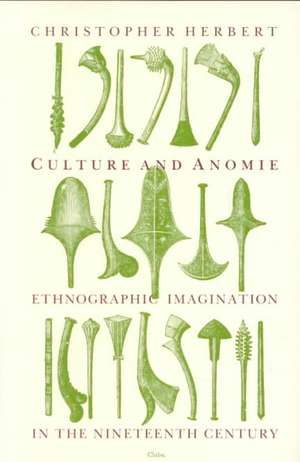Culture and Anomie: Ethnographic Imagination in the Nineteenth Century
Autor Christopher Herberten Limba Engleză Paperback – 31 iul 1991
Few ideas are as important and pervasive in the discourse of the twentieth century as the idea of culture. Yet culture, Christopher Herbert contends, is an idea laden from its inception with ambiguity and contradiction. In Culture and Anomie, Christopher Herbert conducts an inquiry into the historical emergence of the modern idea of culture that is at the same time an extended critical analysis of the perplexities and suppressed associations underlying our own exploitation of this term.
Making wide reference to twentieth-century anthropologists from Malinowski and Benedict to Evans-Pritchard, Geertz, and Lévi-Strauss as well as to nineteenth-century social theorists like Tylor, Spencer, Mill, and Arnold, Herbert stresses the philosophically dubious, unstable character that has clung to the "culture" idea and embarrassed its exponents even as it was developing into a central principle of interpretation.
In a series of detailed studies ranging from political economy to missionary ethnography, Mayhew, and Trollope's fiction, Herbert then focuses on the intellectual and historical circumstances that gave to "culture" the appearance of a secure category of scientific analysis despite its apparent logical incoherence. What he describes is an intimate relationship between the idea of culture and its antithesis, the myth or fantasy of a state of boundless human desire—a conception that binds into a single tradition of thought such seemingly incompatible writers as John Wesley, who called this state original sin, and Durkheim, who gave it its technical name in sociology: anomie.
Methodologically provocative and rich in unorthodox conclusions, Culture and Anomie will be of interest not only to specialists in nineteenth-century literature and intellectual history, but also to readers across the wide range of fields in which the concept of culture plays a determining role.
Making wide reference to twentieth-century anthropologists from Malinowski and Benedict to Evans-Pritchard, Geertz, and Lévi-Strauss as well as to nineteenth-century social theorists like Tylor, Spencer, Mill, and Arnold, Herbert stresses the philosophically dubious, unstable character that has clung to the "culture" idea and embarrassed its exponents even as it was developing into a central principle of interpretation.
In a series of detailed studies ranging from political economy to missionary ethnography, Mayhew, and Trollope's fiction, Herbert then focuses on the intellectual and historical circumstances that gave to "culture" the appearance of a secure category of scientific analysis despite its apparent logical incoherence. What he describes is an intimate relationship between the idea of culture and its antithesis, the myth or fantasy of a state of boundless human desire—a conception that binds into a single tradition of thought such seemingly incompatible writers as John Wesley, who called this state original sin, and Durkheim, who gave it its technical name in sociology: anomie.
Methodologically provocative and rich in unorthodox conclusions, Culture and Anomie will be of interest not only to specialists in nineteenth-century literature and intellectual history, but also to readers across the wide range of fields in which the concept of culture plays a determining role.
Preț: 437.72 lei
Nou
Puncte Express: 657
Preț estimativ în valută:
83.76€ • 87.68$ • 69.30£
83.76€ • 87.68$ • 69.30£
Carte tipărită la comandă
Livrare economică 07-21 aprilie
Preluare comenzi: 021 569.72.76
Specificații
ISBN-13: 9780226327396
ISBN-10: 0226327396
Pagini: 374
Dimensiuni: 152 x 229 x 23 mm
Greutate: 0.45 kg
Ediția:1
Editura: University of Chicago Press
Colecția University of Chicago Press
ISBN-10: 0226327396
Pagini: 374
Dimensiuni: 152 x 229 x 23 mm
Greutate: 0.45 kg
Ediția:1
Editura: University of Chicago Press
Colecția University of Chicago Press
Cuprins
Acknowledgments
Introduction: Superstitions of Culture
1. From Original Sin to Anomie
2. Desire, Wealth, and Value: Anomic Themes in Political Economy
3. Savagery, Culture, and the Subjectivity of Fieldwork in Early Polynesian Ethnography
4. Mayhew's Cockney Polynesia
5. The Novel of Cultural Symbolism: Doctor Thorne
6. Conclusion
Notes
Works Cited
Index
Introduction: Superstitions of Culture
1. From Original Sin to Anomie
2. Desire, Wealth, and Value: Anomic Themes in Political Economy
3. Savagery, Culture, and the Subjectivity of Fieldwork in Early Polynesian Ethnography
4. Mayhew's Cockney Polynesia
5. The Novel of Cultural Symbolism: Doctor Thorne
6. Conclusion
Notes
Works Cited
Index
